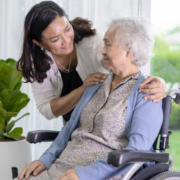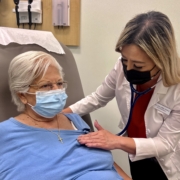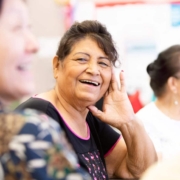How Holistic Care Empowers Senior Independence
As we grow older, maintaining independence becomes one of the most important parts of living a happy and fulfilling life. For seniors, staying independent often depends on their overall well-being—both mentally and physically. This is where holistic care can make a big difference. By focusing on the whole person instead of just one problem or symptom, holistic care helps seniors stay healthier, stronger, and more self-sufficient.
Explores how holistic care supports senior independence and offers practical ways to integrate its benefits into daily life.
What Is Holistic Care?
Holistic care is a way of looking at health that focuses on the whole person instead of just treating symptoms. It includes physical, emotional, mental, and social well-being. For seniors, this approach recognizes that good health is about more than medication or doctor visits. It’s about support in all areas of life.
Instead of focusing on “fixing” issues, holistic care promotes balance. It looks at how different aspects of life connect and affect overall health. For example, a chronic health condition like arthritis might also make someone feel sad or frustrated. Holistic care takes these feelings into account and works to make the person feel better overall—not just manage the arthritis.
Why Is Independence Important to Seniors?
Independence gives seniors a sense of control and freedom in their lives. It allows them to make their own choices, maintain routines, and stay active in their communities. Independence boosts confidence and helps seniors stay connected to the world around them.
However, as people age, challenges like health problems, mobility issues, or a lack of social connections can make it harder to stay independent. This is where holistic care steps in to help seniors overcome these challenges and enjoy a higher quality of life.
How Holistic Care Supports Senior Independence
Holistic care strengthens independence by addressing the different needs that aging adults may face. Here’s how it works:
1. Improves Physical Health
Staying active and healthy is key to maintaining independence. Holistic care encourages exercise, nutrition, and preventive treatments to keep the body strong.
Examples:
- Gentle yoga or stretching to improve balance and mobility.
- Healthy, balanced meals that provide energy and support immunity.
- Regular health checkups to catch problems early.
By focusing on physical well-being, seniors can stay mobile and independent for longer.
2. Boosts Mental Health
Good mental health is just as important as physical health. Holistic care promotes activities and resources that reduce stress and build mental resilience.
Examples:
- Relaxation exercises like deep breathing or mindfulness meditation.
- Social activities to prevent loneliness and create meaningful connections.
- Access to therapy or mental health support when needed.
When seniors feel mentally strong and emotionally supported, they’re more equipped to handle challenges and retain their independence.
3. Encourages Social Connections
Isolation can make seniors lose confidence in their ability to care for themselves. Holistic care emphasizes relationships and community involvement to create a strong support system.
Examples:
- Attending local senior programs or joining hobby groups.
- Regular visits from family members, friends, or volunteers.
- Using technology to stay in contact with loved ones through video calls.
Social connections help seniors feel valued, supported, and capable, which strengthens their ability to live independently.
4. Focuses on Preventive Care
Preventive care is a key part of holistic health, helping seniors avoid health problems before they occur. This approach reduces the need for treatments or hospital visits and helps maintain independence.
Examples:
- Encouraging vaccinations, like flu shots, to prevent illness.
- Monitoring chronic conditions like high blood pressure or diabetes to keep them under control.
- Promoting regular physical activity to prevent falls or injuries.
By staying ahead of health concerns, seniors can enjoy more years of quality living without depending heavily on others.
5. Gives Personal Care Plans
Since every senior is unique, holistic care involves creating personalized care plans that address individual needs. These plans include input from healthcare providers, caregivers, and even the seniors themselves to ensure well-rounded support.
Examples:
- Working with a team of professionals to manage medication, therapy, and diet.
- Customizing daily schedules to balance rest, activity, and social interaction.
- Including hobbies or interests that bring joy and purpose to life.
When care is tailored to a senior’s specific needs, they’re more likely to thrive and maintain a sense of independence.
Ways to Incorporate Holistic Care
Anyone can integrate holistic care into a loved one’s or their own daily life. These simple steps can make a big difference in supporting mental and physical well-being:
- Encourage movement: Help seniors find enjoyable ways to stay active, like walking or gardening.
- Promote healthy eating: Prepare well-balanced, nutrient-rich meals with whole foods.
- Stay connected: Set regular visits, plan family activities, or encourage joining local groups.
- Provide emotional support: Show patience and understanding when they face challenges.
- Engage the mind: Encourage games, puzzles, or learning a new skill to keep the brain active.
Small changes like these add up quickly and can significantly impact independence.
Why Holistic Care Is the Future of Senior Care
Holistic care offers hope for aging adults by addressing the biggest challenges they face while preserving the essence of who they are. It pulls together physical, mental, and social support in a way that feels natural and empowering.
By prioritizing the whole person and not just one issue, holistic care proves that seniors can enjoy greater freedom, health, and happiness—even in their later years.
If you or someone you love wants to stay independent longer, holistic care might be the key to achieving that goal. Start small, explore resources in your local community, and watch how even the simplest changes can create a big difference.
This blog is for informational purposes only and is not intended as professional advice. Always consult a qualified healthcare provider or specialist for specific questions or concerns.
It’s your life. Live it your way.
WelbeHealth provides full-service healthcare and personalized support to help your loved ones age well at home and in your community. Our Program of All-Inclusive Care for the Elderly (PACE) meets the changing needs of seniors, often at no cost, while helping you navigate life as a caregiver. To see if you qualify, call: (888) 750-0248 | TTY 711 or visit: welbehealth.com/contact















































































